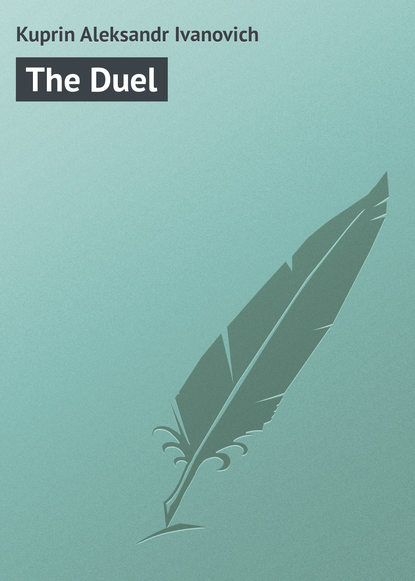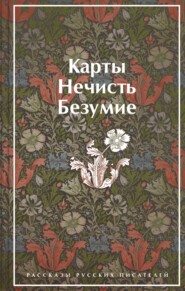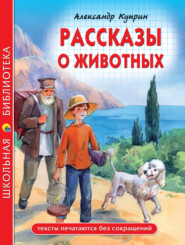По всем вопросам обращайтесь на: info@litportal.ru
(©) 2003-2024.
✖
The Duel
Настройки чтения
Размер шрифта
Высота строк
Поля
“Hips steady. Rise on your toes. Bend your knees.”
And directly after that, very softly and in a sing-song voice —
“Begin.”
“One,” sang out the soldiers in unison, and they simultaneously performed in slow time the order to bend the knees till the whole division found itself on its haunches.
Bobyliev, who likewise performed the same movement, scrutinized the soldiers with severe, critical, and aggressive eyes. Immediately beside him cried the little spasmodic corporal, Syeroshtán, in his sharp, squeaky voice that reminded one of a cockerel squabbling for food —
“Stretch your arms to the right – and left – salute. Begin, one, two, one, two,” and directly afterwards ten smart young fellows were heard yelling at the top of their voices the regulation —
“Haú, haú, haú.”
“Halt,” shouted Syeroshtán, red of face from rage and over-exertion. “La-apschin, you great ass, you toss about, give yourself airs, and twist your arm like some old woman from Riasan —choú, choú. Do the movements properly, or by all that’s unholy I’ll – ”
After this the subalterns led their respective divisions at quick march to the gymnastic apparatus, which had been set up in different parts of the parade-ground. Sub-lieutenant Lbov – young, strong, and agile, and also an expert gymnast – threw down his sabre and cap, and ran before the others to one of the bars. Grasping the bar with both his hands, after three violent efforts he made a somersault in the air, threw himself forward and finally landed himself on all fours two yards and a half from the bar.
“Sub-lieutenant Lbov, at your everlasting circus tricks again,” shrieked Captain Sliva in a tone meant to be severe. In his heart the old warrior cherished a sneaking affection for Lbov, who was a thoroughly efficient soldier, and, by his brave bearing, invaluable at parades. “Be good enough to observe the regulation, and keep the other thing till Carnival comes round.”
“Right, Captain!” yelled Lbov in reply; “but I shan’t obey,” he whispered to Romashov with a wink.
The 4th platoon exercised on the inclined ladder. The soldiers walked in turn to the ladder, gripped hold of the steps, and climbed up them with arms bent. Shapovalenko stood below and made remarks —
“Keep your feet still. Up with your soles.”
The turn now came to a little soldier in the left wing, whose name was Khliabnikov, who served as a butt to the entire company. Whenever Romashov caught sight of him, he wondered how this emaciated, sorry figure, in height almost a dwarf, whose dirty little beardless face was but a little larger than a man’s fist, could have been admitted into the army. And when he met Khliabnikov’s soulless eyes, which looked as if they had expressed nothing but a dull submissive fear ever since he was born, he felt in his heart a heavy, oppressive feeling of disgust and prick of conscience.
Khliabnikov hung motionless on the ladder like a dead, shapeless mass.
“Take a grip and raise yourself on your arms, you miserable dog!” shrieked the sergeant. “Up with you, I say.”
Khliabnikov made a violent effort to show his obedience, but in vain. He remained in the same position, and his legs swung from side to side. For the space of a second he turned downwards and sideways his ashen grey face, in which the dirty little turned-up nose obstinately turned upwards. Suddenly he let go of the ladder and fell like a sack to the ground.
“Ho, ho, you refuse to obey orders, to make the movement you were ordered to do,” roared the sergeant; “but a scoundrel like you shall not destroy discipline. Now you shall – ”
“Shapovalenko, don’t touch him!” shouted Romashov, beside himself with anger and shame. “I forbid you to strike him now and always.” Romashov rushed up and pulled the sergeant’s arm.
Shapovalenko instantaneously became stiff and erect, and raised his hand to his cap. In his eyes, which at once resumed their ordinary lifeless expression, and on his lips there gleamed a faint mocking smile.
“I will obey, your Honour, but permit me to report that that fellow is utterly impossible.”
Khliabnikov took his place once more in the ranks. He looked lazily out of the corner of his eyes at the young officer, and stroked his nose with the back of his hand. Romashov turned his back on him and went off, meditating painfully over this fruitless pity, to inspect the 3rd platoon.
After the gymnastics the soldiers had ten minutes’ rest. The officers forgathered at the bars, almost in the middle of the exercise-ground. Their conversation turned on the great May parade, which was approaching.
“Well, it now remains for us to guess where the shoe pinches,” began Sliva, as he swung his arms, and opened wide his watery blue eyes, “for I’ll tell you one thing, every General has his special little hobby. I remember we once had a Lieutenant-General Lvovich for the commander of our corps. He came to us direct from the Engineers. The natural consequence was we never did anything except dig and root up earth. Drill, marching, and keeping time – all such were thrown on the dust-heap. From morning to night we built cottages and quarters – in summer, of earth; in winter, of snow. The whole regiment looked like a collection of clodhoppers, dirty beyond recognition. Captain Aleinikov, the commander of the 10th Company – God rest his soul! – became a Knight of St. Anne, because he had somehow constructed a little redoubt in two hours.”
“That was clever of him,” observed Lbov.
“Wait, I have more to remind you of. You remember, Pavel Pavlich, General Aragonski and his everlasting gunnery instructions?”
“And the story of Pontius Pilate,” laughed Viätkin.
“What was that?” asked Romashov.
Captain Sliva made a contemptuous gesture with his hand.
“At that time we did nothing but read Aragonski’s ‘Instructions in Shooting.’ One day it so happened that one of the men had to pass an examination in the Creed. When the soldier got to the clause ‘suffered under Pontius Pilatus,’ there was a full stop. But the fellow did not lose his head, but went boldly on with a lot of appropriate excerpts from Aragonski’s ‘Instructions in Shooting,’ and came out with flying colours. Ah, you may well believe, those were grand times for idiocy. Things went so far that the first finger was not allowed to retain its good old name, but was called the ‘trigger finger,’ etc., etc.”
“Do you remember, Athanasi Kirillich, what cramming and theorizing – ‘range,’ elevation, etc. – went on from morning to night? If you gave the soldier a rifle and said to him: ‘Look down the barrel. What do you see there?’ you got for an answer: ‘I see a tense line which is the gun’s axis,’ etc. And what practice in shooting there was in those days, you remember, Athanasi Kirillich!”
“Do I remember! The shooting in our division was the talk of the whole country, ah, even the foreign newspapers had stories about it. At the shooting competitions regiments borrowed ‘crack’ shots from each other. Down at the butts stood young officers hidden behind a screen, who helped the scoring by their revolvers. On another occasion it so happened that a certain company made more hits in the target than could be accounted for by the shots fired, whereupon the ensign who was marking got severely ‘called over the coals.’”
“Do you recollect the Schreiberovsky gymnastics in Slesarev’s time?”
“Rather! It was like a ballet. Ah, may the devil take all those old Generals with their hobbies and eccentricities. And yet, gentlemen, all that sort of thing – all the old-time absurdities, were as nothing compared with what is done in our days. It might be well said that discipline has received its quietus. The soldier, if you please, is now to be treated ‘humanely.’ He is our ‘fellow-creature,’ our ‘brother’; his ‘mind is to be developed,’ he is to be taught ‘to think,’ etc., etc. What absolute madness! No, he shall have a thrashing, the scoundrel. And oh, my saintly Suvorov, tell me if a single individual nowadays knows how a soldier ought to be treated, and what one should teach him. Nothing but new-fangled arts and rubbish. That invention in regard to cavalry charges, for instance.”
“Yes, one might have something more amusing,” Viätkin chimed in.
“There you stand,” continued Sliva, “in the middle of the field, like a decoy-bird, and the Cossacks rush at you in full pelt. Naturally, like a sensible man, you make room for them in good time. Directly after comes: ‘You have bad nerves, Captain; one should not behave in that way in the army. Be good enough to recollect that,’ etc., etc., in the same style.”
“The General in command of the K – Regiment,” interrupted Viätkin, “once had a brilliant idea. He had a company marched to the edge of an awful cesspool, and then ordered the Captain to order the men to lie down. The latter hesitated for an instant, but obeyed the command. The soldiers were chapfallen, gazing at one another in a questioning way. All thought they had heard incorrectly; but they got their information right enough. The General thundered away at the poor Captain in the presence of all. ‘What training do you give your company? Miserable lot of weaklings. Pretty heroes to take into the field. No, you are cravens, every one of you, and you, Captain, not the least among them. March to arrest.’”
“That ‘takes the cake,’” laughed Lbov.
“And what’s the use of it? First one insults the officers in the presence of the men, and then complaints are made of lack of discipline. But to give a scamp his deserts is a thing one dare not do. He is, if you please, a ‘human being,’ a ‘personage’; but in the good old times there were no ‘personages’ in the army. Then the cattle got what they needed, and then there was the Italian Campaign, Sebastopol, and several other trifles. Well, all the same thing, so far as I am concerned. I’ll do my duty even if it costs me my commission, and as far as my arm reaches every scoundrel shall get his deserts.”
“There’s no honour in striking a soldier,” exclaimed Romashov, in a muffled voice. Up to this he had been merely a silent listener. “One can’t hit a man who is not allowed to raise a hand in self-defence. It is as cowardly as it is cruel.”
Captain Sliva bestowed on Romashov an annihilating look, pressed his underlip against his little grey, bristling moustache, and at length exclaimed, with an expression of the deepest contempt —
“Wha-at’s that?”
Romashov stood as white as a corpse, his pulse beat violently, and a cold shudder ran through his body.
“I said that such a method of treatment was cruel and cowardly, and I – retain my opinion,” answered Romashov nervously, but without flinching.
“You don’t say so!” twittered Sliva. “Listen to my young cockerel. Should you, against all likelihood, be another year with the regiment, you shall be provided with a muzzle. That you may rely on. Thank God, I know how to deal with such germs of evil. Don’t worry yourself about that.”
Romashov fearlessly directed at him a glance of hatred, straight in his eyes, and said, almost in a whisper —
“If ever I see you maltreat a soldier I will report it at once to the commander of the regiment.”
“What, do you dare?” shrieked Sliva in a threatening voice, but checked himself instantly. “Enough of this,” he went on to say dryly; “you ensigns are a little too young to teach veterans who have smelt powder, and who have, for more than a quarter of a century, served their Tsar without incurring punishment. Officers, return to your respective posts.”
Captain Sliva turned his back sharply on the officers and went away.
“Why do you poke your nose into all that?” asked Viätkin as he took Romashov by the arm and left the place. “As you know, that old plum[16 - Sliva is the Russian for plum.] isn’t one of the sweetest; besides, you don’t know him yet as well as I do. Be careful what you are about; he is not to be played with, and some fine day he’ll put you in the lock-up in earnest.”

















